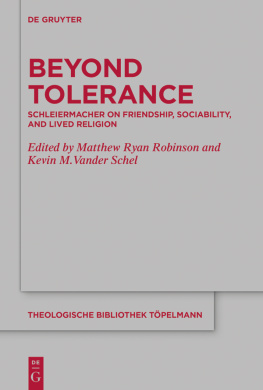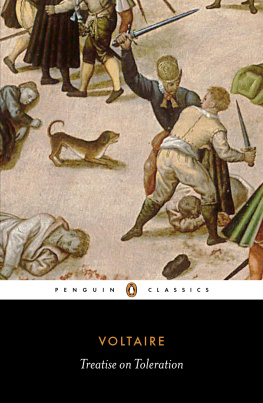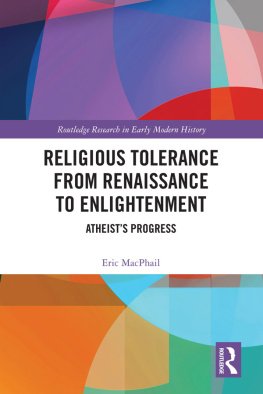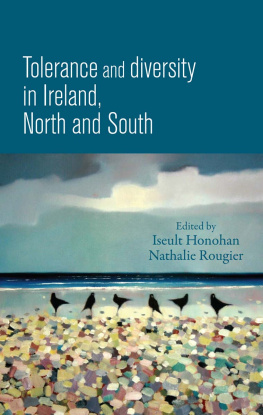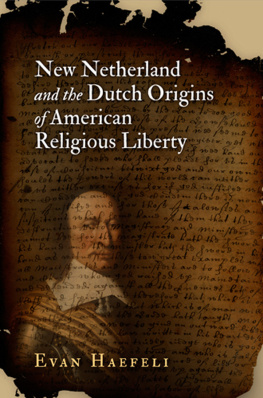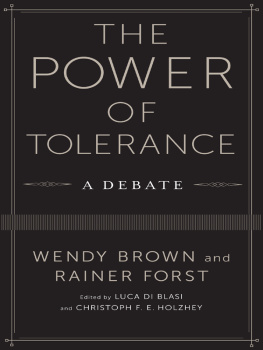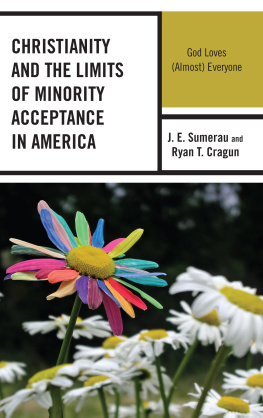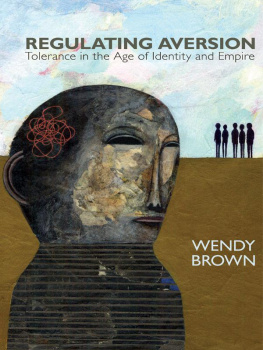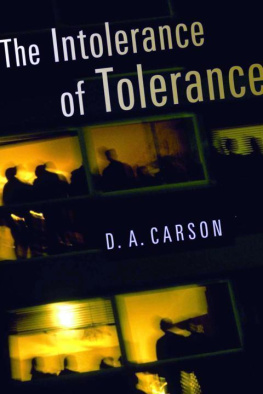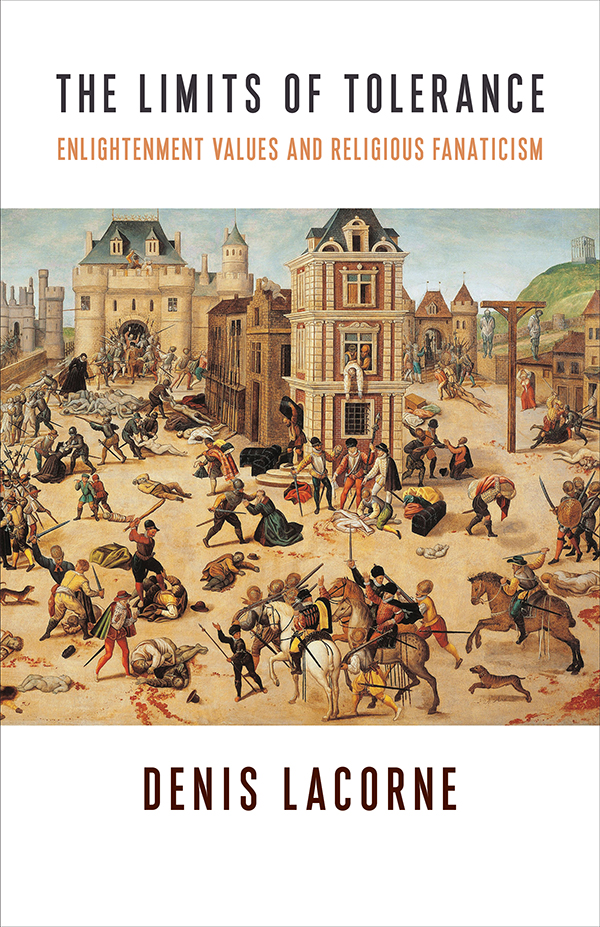Contents
Guide
Pagebreaks of the print version
THE LIMITS OF TOLERANCE
RELIGION, CULTURE, AND PUBLIC LIFE
RELIGION, CULTURE, AND PUBLIC LIFE
SERIES EDITOR: KATHERINE PRATT EWING
The resurgence of religion calls for careful analysis and constructive criticism of new forms of intolerance, as well as new approaches to tolerance, respect, mutual understanding, and accommodation. In order to promote serious scholarship and informed debate, the Institute for Religion, Culture, and Public Life and Columbia University Press are sponsoring a book series devoted to the investigation of the role of religion in society and culture today. This series includes works by scholars in religious studies, political science, history, cultural anthropology, economics, social psychology, and other allied fields whose work sustains multidisciplinary and comparative as well as transnational analyses of historical and contemporary issues. The series focuses on issues related to questions of difference, identity, and practice within local, national, and international contexts. Special attention is paid to the ways in which religious traditions encourage conflict, violence, and intolerance and also support human rights, ecumenical values, and mutual understanding. By mediating alternative methodologies and different religious, social, and cultural traditions, books published in this series will open channels of communication that facilitate critical analysis.
For the list of titles in this series, see .
THE LIMITS OF TOLERANCE
ENLIGHTENMENT VALUES AND RELIGIOUS FANATICISM
DENIS LACORNE
TRANSLATED BY
C. JON DELOGU AND ROBIN EMLEIN
Columbia University Press New York

Columbia University Press
Publishers Since 1893
New YorkChichester, West Sussex
cup.columbia.edu
Les frontires de la tolrance 2016 Editions Gallimard, Paris
English translation copyright 2019 Columbia University Press
All rights reserved
E-ISBN 978-0-231-54704-8
Library of Congress Cataloging-in-Publication Data
Names: Lacorne, Denis, author.
Title: The limits of tolerance : enlightenment values and religious fanaticism / Denis Lacorne ; translated by C. Jon Delogu and Robin Emlein.
Other titles: Frontieres de la tolerance. English
Description: New York : Columbia University Press, 2019. | Series: Religion, culture, and public life | Includes bibliographical references and index.
Identifiers: LCCN 2018038374 (print) | LCCN 2018059537 (ebook) | ISBN 9780231187145 (cloth : alk. paper)
Subjects: LCSH: TolerationHistory. | Religious toleranceHistory. | Freedom of religionHistory. | Freedom of speechHistory.
Classification: LCC BJ1432 (ebook) | LCC BJ1432 .L3313 2019 (print) | DDC 179/.9dc23
LC record available at https://lccn.loc.gov/2018038374
A Columbia University Press E-book.
CUP would be pleased to hear about your reading experience with this e-book at .
Cover image: St. Bartholomews Day Massacre , c. 1572-84 (oil on panel), Dubois, Francois (15291584) / Musee Cantonal des Beaux-Arts de Lausanne, Switzerland / De Agostini Picture Library / G. Dagli Orti / Bridgeman Images
Cover design: Chang Jae Lee
Columbia University Press gratefully acknowledges the generous contribution to this book provided by the Florence Gould Foundation Endowment Fund for French Translation.
To the memory of Tony Judt and Al Stepan

CONTENTS
T he ideas behind this book emerged from a stay at Columbia Universitys newly created Institute for Religion, Culture, and Public Life in the spring of 2008 (supported by an Alliance grant) and a visiting fellowship at the Stanford Humanities Center in the winter of 2013. At Columbia I was fortunate to participate in a seminar, Challenges to Diverse Models of Secularism in the United States, France, and Turkey, co-organized with Al Stepan and Ahmet Kuru. While at Columbia, I had the chance to engage in numerous thought-provoking conversations with Al Stepan and Mark Lilla.
At Stanford I was able to develop my reflection on the management of religious symbols in the public square, centered on current debates about the permission or prohibition of Islamic veils. Stimulating discussions were provided by my Stanford colleagues, in particular Aron Rodrigue, Jack Rakove, and Keith Baker in the History Department; Michael McConnell, Richard Ford, and Avishai Margalit at the Stanford Law School; Ccile Alduy, Dan Edelstein, and Marie-Pierre Ulloa in the Division of Literatures, Cultures, and Languages; Charlotte Fonrobert in the Department of Religious Studies; and Bruce Cain, David Brady, and Mo Fiorina in the Political Science Department. Generous support from the France-Stanford Center for Interdisciplinary Study allowed me to run an international conference, The New Politics of Church/State Relations, in December 2015. I am grateful to Laurent Cohen-Tanugi, an international lawyer who then taught at Stanford Law School, for his help in preparing and co-organizing this conference.
Back in France, many of the ideas tested in this bicoastal American environment were further developed in a three-year research seminar, Religion and Globalization, which I conducted at the CERISciences Po with Joseph Mala (then director of CAPS, the policy planning staff of the French Ministry of Foreign Affairs) and Jean-Paul Willaime (then director of the Institut Europen en Science des Religions). Participants in this seminar generated lively discussions and provided an exceptional comparative and global perspective, and this book has greatly benefited from their contributions. A conference on Religion and Foreign Policy concluded the seminar on November 56, 2013. The proceedings of the conference were published under the title La diplomatie au dfi des religions (Paris: Odile Jacob, 2014). I wish to thank the co-organizers of the conference (and coeditors of the book), Justin Vasse and Jean-Paul Willaime, for their enthusiastic support.
I am also particularly grateful to the successive directors of the CERIJean-Franois Bayart, Christophe Jaffrelot, Christian Lequesne, and Alain Dieckhoffwho supported my research and allowed me to expand its scope beyond the narrow field of American politics.
I could not have written this book without the constant, challenging, and stimulating discussions with my wife, Maria Ruegg, and with the invaluable help, critical comments, and friendly support of my two editorsRan Halvi at Gallimard and Wendy Lochner at Columbia University Press.
This book is dedicated to the memory of Tony Judt and Al Stepantwo great friends and mentors who knew that good research cannot be restricted to a single scholarly discipline. They both understood that history, to be meaningful, must be long-term history and that political science and political philosophy gain much from a genuine comparative perspective.
T here are numerous historical examples of religious tolerance, from ancient Greece to the Roman Empire, medieval Spain to the Ottoman Empire and the Venetian Republic. But, generally speaking, these are not examples of tolerance in the modern sense of the term. They are rather examples of toleration: systems in which diverse religions are suffered for the sake of keeping the peace. The Latin root for toleration, tolerantia , is derived from the verb tolerare : to accept, endure, put up with, support with courage a burden or a difficult condition of life.


